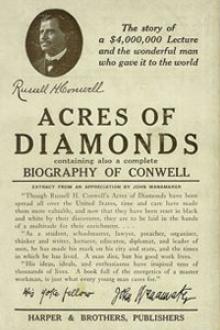Acres of Diamonds - Russell H. Conwell (big screen ebook reader .txt) 📗

- Author: Russell H. Conwell
- Performer: 1599869802
Book online «Acres of Diamonds - Russell H. Conwell (big screen ebook reader .txt) 📗». Author Russell H. Conwell
When Dr. Conwell first assumed charge of the little congregation that led him to Philadelphia it was really a little church both in its numbers and in the size of the building that it occupied, but it quickly became so popular under his leadership that the church services and Sunday-school services were alike so crowded that there was no room for all who came, and always there were people turned from the doors.
One afternoon a little girl, who had eagerly wished to go, turned back from the Sunday-school door, crying bitterly because they had told her that there was no more room. But a tall, black-haired man met her and noticed her tears and, stopping, asked why it was that she was crying, and she sobbingly replied that it was because they could not let her into the Sunday-school.
“I lifted her to my shoulder,” says Dr. Conwell, in telling of this; for after hearing the story elsewhere I asked him to tell it to me himself, for it seemed almost too strange to be true.
“I lifted her to my shoulder”—and one realizes the pretty scene it must have made for the little girl to go through the crowd of people, drying her tears and riding proudly on the shoulders of the kindly, tall, dark man! “I said to her that I would take her in, and I did so, and I said to her that we should some day have a room big enough for all who should come. And when she went home she told her parents—I only learned this afterward—that she was going to save money to help build the larger church and Sunday-school that Dr. Conwell wanted! Her parents pleasantly humored her in the idea and let her run errands and do little tasks to earn pennies, and she began dropping the pennies into her bank.
“She was a lovable little thing—but in only a few weeks after that she was taken suddenly ill and died; and at the funeral her father told me, quietly, of how his little girl had been saving money for a building-fund. And there, at the funeral, he handed me what she had saved—just fifty-seven cents in pennies.”
Dr. Conwell does not say how deeply he was moved; he is, after all, a man of very few words as to his own emotions. But a deep tenderness had crept into his voice.
“At a meeting of the church trustees I told of this gift of fifty-seven cents—the first gift toward the proposed building-fund of the new church that was some time to exist. For until then the matter had barely been spoken of, as a new church building had been simply a possibility for the future.
“The trustees seemed much impressed, and it turned out that they were far more impressed than I could possibly have hoped, for in a few days one of them came to me and said that he thought it would be an excellent idea to buy a lot on Broad Street—the very lot on which the building now stands.” It was characteristic of Dr. Conwell that he did not point out, what every one who knows him would understand, that it was his own inspiration put into the trustees which resulted in this quick and definite move on the part of one of them. “I talked the matter over with the owner of the property, and told him of the beginning of the fund, the story of the little girl. The man was not one of our church, nor in fact, was he a church-goer at all, but he listened attentively to the tale of the fifty-seven cents and simply said he was quite ready to go ahead and sell us that piece of land for ten thousand dollars, taking—and the unexpectedness of this deeply touched me taking a first payment of just fifty-seven cents and letting the entire balance stand on a five-per-cent. mortgage!
“And it seemed to me that it would be the right thing to accept this unexpectedly liberal proposition, and I went over the entire matter on that basis with the trustees and some of the other members, and all the people were soon talking of having a new church. But it was not done in that way, after all, for, fine though that way would have been, there was to be one still finer.
“Not long after my talk with the man who owned the land, and his surprisingly good-hearted proposition, an exchange was arranged for me one evening with a Mount Holly church, and my wife went with me. We came back late, and it was cold and wet and miserable, but as we approached our home we saw that it was all lighted from top to bottom, and it was clear that it was full of people. I said to my wife that they seemed to be having a better time than we had had, and we went in, curious to know what it was all about.
And it turned out that our absence had been intentionally arranged, and that the church people had gathered at our home to meet us on our return.
And I was utterly amazed, for the spokesman told me that the entire ten thousand dollars had been raised and that the land for the church that I wanted was free of debt. And all had come so quickly and directly from that dear little girl’s fifty-seven cents.”
Doesn’t it seem like a fairy tale! But then this man has all his life been making fairy tales into realities. He inspired the child. He inspired the trustees. He inspired the owner of the land. He inspired the people.
The building of the great church—the Temple Baptist Church, as it is termed—was a great undertaking for the congregation; even though it had been swiftly growing from the day of Dr.
Conwell’s taking charge of it, it was something far ahead of what, except in the eyes of an enthusiast, they could possibly complete and pay for and support. Nor was it an easy task.
Ground was broken for the building in 1889, in 1891 it was opened for worship, and then came years of raising money to clear it. But it was long ago placed completely out of debt, and with only a single large subscription—one of ten thousand dollars—for the church is not in a wealthy neighborhood, nor is the congregation made up of the great and rich.
The church is built of stone, and its interior is a great amphitheater. Special attention has been given to fresh air and light; there is nothing of the dim, religious light that goes with medieval churchliness. Behind the pulpit are tiers of seats for the great chorus choir. There is a large organ.
The building is peculiarly adapted for hearing and seeing, and if it is not, strictly speaking, beautiful in itself, it is beautiful when it is filled with encircling rows of men and women.
Man of feeling that he is, and one who appreciates the importance of symbols, Dr. Conwell had a heart of olive-wood built into the front of the pulpit, for the wood was from an olive-tree in the Garden of Gethsemane. And the amber-colored tiles in the inner walls of the church bear, under the glaze, the names of thousands of his people; for every one, young or old, who helped in the building, even to the giving of a single dollar, has his name inscribed there. For Dr. Conwell wished to show that it is not only the house of the Lord, but also, in a keenly personal sense, the house of those who built it.
The church has a possible seating capacity of 4,200, although only 3,135 chairs have been put in it, for it has been the desire not to crowd the space needlessly. There is also a great room for the Sunday-school, and extensive rooms for the young men’s association, the young women’s association, and for a kitchen, for executive offices, for meeting-places for church officers and boards and committees. It is a spacious and practical and complete church home, and the people feel at home there.
“You see again,” said Dr. Conwell, musingly, “the advantage of aiming at big things. That building represents $109,000 above ground. It is free from debt. Had we built a small church, it would now be heavily mortgaged.”
IVHIS POWER AS ORATOR AND PREACHER
EVEN as a young man Conwell won local fame as an orator. At the outbreak of the Civil War he began making patriotic speeches that gained enlistments. After going to the front he was sent back home for a time, on furlough, to make more speeches to draw more recruits, for his speeches were so persuasive, so powerful, so full of homely and patriotic feeling, that the men who heard them thronged into the ranks. And as a preacher he uses persuasion, power, simple and homely eloquence, to draw men to the ranks of Christianity.
He is an orator born, and has developed this inborn power by the hardest of study and thought and practice. He is one of those rare men who always seize and hold the attention. When he speaks, men listen. It is quality, temperament, control—the word is immaterial, but the fact is very material indeed.
Some quarter of a century ago Conwell published a little book for students on the study and practice of oratory. That “clear-cut articulation is the charm of eloquence” is one of his insisted-upon statements, and it well illustrates the lifelong practice of the man himself, for every word as he talks can be heard in every part of a large building, yet always he speaks without apparent effort.
He avoids “elocution.” His voice is soft-pitched and never breaks, even now when he is over seventy, because, so he explains it, he always speaks in his natural voice. There is never a straining after effect.
“A speaker must possess a large-hearted regard for the welfare of his audience,” he writes, and here again we see Conwell explaining Conwellism.
“Enthusiasm invites enthusiasm,” is another of his points of importance; and one understands that it is by deliberate purpose, and not by chance, that he tries with such tremendous effort to put enthusiasm into his hearers with every sermon and every lecture that he delivers.
“It is easy to raise a laugh, but dangerous, for it is the greatest test of an orator’s control of his audience to be able to land them again on the solid earth of sober thinking.” I have known him at the very end of a sermon have a ripple of laughter sweep freely over the entire congregation, and then in a moment he has every individual under his control, listening soberly to his words.
He never fears to use humor, and it is always very simple and obvious and effective. With him even a very simple pun may be used, not only without taking away from the strength of what he is saying, but with a vivid increase of impressiveness.
And when he says something funny it is in such a delightful and confidential way, with such a genial, quiet, infectious humorousness, that his audience is captivated. And they never think that he is telling something funny of his own; it seems, such is the skill of the man, that he is just letting them know of something humorous that they are to enjoy with





Comments (0)